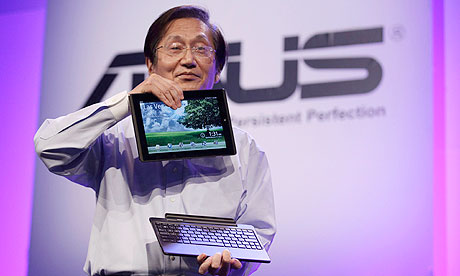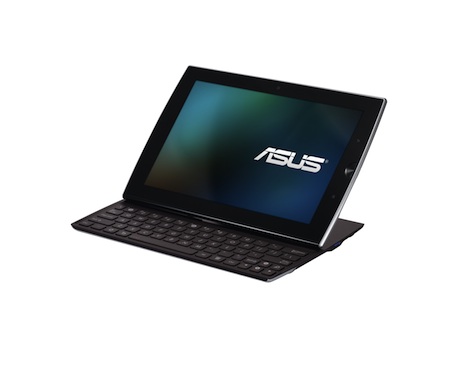

Asus EeePad Slider. For when you can't quite bear not to have a tablet that isn't a laptop? 14:38: Next up: the EeePad Slider, "a unique hybrid of tablet and portable PC.. so you've got a keyboard all the time." Already I'm starting to think that Asus doesn't itself know what people want, and is throwing designs at the world in the hope that one of them will prove popular. Is this a good idea? True, there's a risk in only offering one design: you might pick the wrong horse.
But having four different designs? A 7" Android tablet, a 12" Windows tablet, a sometimes-tablet, a never-quite-a-tablet? OK, Shih said that he wants to offer the combination of innovation and choice, but this feels a bit scattered. Offering all of those products, with the different combinations of SKUs (product models) - different RAM, different storage - is the sort of thing that drives supply chain managers up the wall because they can't forecast who'll want what, which inevitably leads to oversupply in some places and shortages (you hope) in others. This is why multiple products that do roughly the same thing is a bad idea: because it leaves you with excess inventory which either has to be sold off or sent to landfill, and either way wrecks your financials.
The Slider will, apparently, run on Android 3.0 "Honeycomb" - really? That's fascinating, because this is the first sighting of Honeycomb anywhere to my knowledge - 10" screen, Nvidia Tegra 2 processors, dual cameras, HDMI, USB, card reader.
14:40: Gary the Texan is back to show it off. "I feel like I'm living up here," he says from the stage. Can't quite express how monotone his monotone is. Supremely underwhelming showing of what ought to be amazing: Honeycomb? In the wild? But we're shown nothing that suggests this is really Honeycomb on the machine. It could be Android 2.2. We'd be none the wiser from the demo.
We've come along to Asus's press conference, the first of CES. Let's get this ball rolling! Times are as it happened in PST, so not contemporary to this moment.
14:43: Shih is talking about something vague to do with the cloud and web 2.0 under the title "Triple-Play Digit-Net" (that's what it says on the slide). I don't honestly know what his point is here. It's like when Bill Gates tried to explain the cloud with the worst slide in the world. "Together with the silicon brain, together with the human brain, that's the best of Web 2.0," says Shih. To utter silence.
14:46: "We can put the silicon brain into things.. but their aim is always to serve PEOPLE!" I'm not quite following. "Where are your friends, where is the parking space... I think this is the real concept of web 2.0." Really, Mr Shih?"And here I'd like to introduce another concept... through the concept of the interface make the whole of the family .. I think each home may need a home CIO." Oh dear - isn't that what good user interface design is meant to make redundant? "Including videoconferencing.. where you go outside and create a video.." I'm going to stop typing for a bit until he rejoins the planet.
14:51: Ah. We're back. Short film. "IRIS: Inspirational Research for Immersive Space... what if the device adapts to your work space?" Yes, it's the home of the future - just like that thing you've been seeing for, ooh, the past 50 years. It seems to involve a wristwatch that has a detachable screen that can be blown up into a tablet the size of an iPad. That's not far away at all, is it?
14:53: And he's gone, and we're done. We're perplexed as hell, and we haven't even been given the chance to ask questions. Nor, indeed, to get hands-on. (Ignore any Google results that say "hands-on" relating to this presentation: nobody except the Asus execs got their hands on these products.)
All the devices are being hurried off the stage. We later learn that every single device was taken straight out of the building immediately the talk had concluded - meaning there's no danger just yet of anyone getting their hands on them. Just as good: the electronic press kit handed out at the end includes a picture of the "Transformer", but it's a zero-byte file.
Overall? A strategy without a strategy. Asus doesn't control enough of the supply chain: it isn't improving Android, it can't write software worth a damn, and it's at the mercy of both Microsoft and Google in trying to advance its fortunes. Then again, the hardware-only business isn't that great: its Q3 2010 results suggest a profit margin of about 5% after tax (which is about half of what you'd aim for as a rule of thumb). Asus is stuck between a rock (Windows) and a hard place (Android); all it can hope for is that others will find it even harder.
OK, well - the rest of CES can surely improve on this.
Hiç yorum yok:
Yorum Gönder